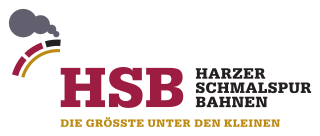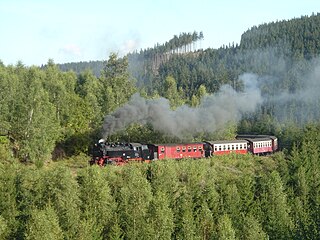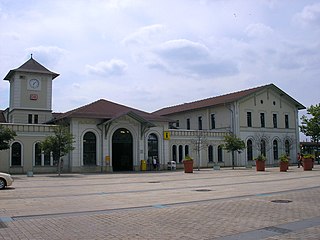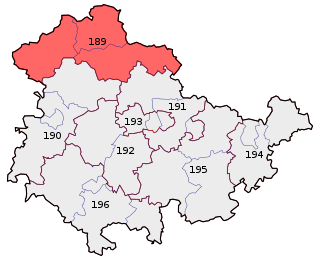Nordhausen is a Kreis (district) in the north of Thuringia, Germany. Neighboring districts are : Harz and Mansfeld-Südharz in Saxony-Anhalt; Kyffhäuserkreis and Eichsfeld in Thuringia; and Göttingen and Goslar in Lower Saxony.

Nordhausen is a city in Thuringia, Germany. It is the capital of the Nordhausen district and the urban centre of northern Thuringia and the southern Harz region; its population is 42,000. Nordhausen is located approximately 60 km north of Erfurt, 80 km west of Halle, 85 km south of Braunschweig and 60 km east of Göttingen.

Mittelbau-Dora was a Nazi concentration camp located near Nordhausen in Thuringia, Germany. It was established in late summer 1943 as a subcamp of Buchenwald concentration camp, supplying slave labour from many Eastern countries occupied by Germany, for extending the nearby tunnels in the Kohnstein and for manufacturing the V-2 rocket and the V-1 flying bomb. In the summer of 1944, Mittelbau became an independent concentration camp with numerous subcamps of its own. In 1945, most of the surviving inmates were sent on death marches or crammed in trains of box-cars by the SS. On 11 April 1945, US troops freed the remaining prisoners.

The Harz Narrow Gauge Railways is a railway company that operates a 1,000 mmmetre gauge network in the Harz mountains, in central Germany. The company was formed after the Second World War as a merger of two earlier companies. It owns about 140 kilometres of track, connecting the principal towns of Wernigerode, Nordhausen and Quedlinburg and several smaller settlements in the area. Much of the network is steeply graded and picturesque, but its most popular destination is the Brocken, the highest mountain in the region. The company runs a significant number of its trains with steam haulage, mostly employing 1950s vintage 2-10-2 tank locomotives, hauling traditional open-platform bogie carriages. The company is mainly owned by the various local authorities whose territories it serves.

Mittelwerk was a German World War II factory built underground in the Kohnstein to avoid Allied bombing. It used slave labor from the Mittelbau-Dora concentration camp to produce V-2 ballistic missiles, V-1 flying bombs, and other weapons.

The Harz Railway or Trans-Harz Railway was formerly the main line of the Harz Narrow Gauge Railways and runs north to south right across the Harz Mountains from Wernigerode to Nordhausen. However, the tourist attraction of the Brocken, the highest mountain in the Harz, is so great that the Brocken Railway is effectively the main line today. The Trans-Harz Railway joins up with the Selke Valley Railway to Quedlinburg at Eisfelder Talmühle where all trains are organised to make good connections.

FSV Wacker 90 Nordhausen is a German association football club from Nordhausen, Thuringia.

Korn, also known as Kornbrand or Kornbranntwein, is a German colorless distilled beverage produced from fermented cereal grain seed. In the production of Korn only the cereal grain types rye, wheat, barley, oats and buckwheat are permissible. Most of the production is based on rye or wheat; barley is mainly used to obtain the required malt for the brewing process, while oats and buckwheat are rarely used. The addition of food colorings, flavorings, or sweeteners is not permitted. Korn differs from vodka in that it is distilled to lower alcoholic proofs and less rigorously filtered, which leaves more of the cereal grain flavor in the finished spirit.

The Biographisch-Bibliographisches Kirchenlexikon (BBKL) is a German biographical encyclopedia covering persons related to the history of the church, philosophy and literature, founded 1975 by Friedrich Wilhelm Bautz.

The Halle–Hann. Münden railway is a 218 km long main line operated by the Deutsche Bahn in Germany, which links Halle (Saale) in Saxony-Anhalt with Hann. Münden in the state of Lower Saxony. It is mainly used by regional and east-west goods trains. From 1990 to 1994 it was upgraded as part of a German Unification Transport Project.

The B 243 runs from Hildesheim over Seesen and Herzberg am Harz to Nordhausen.
Benjamin Förster is a German professional footballer who plays as a striker for ZFC Meuselwitz.

The Nordhausen tramway network is a network of tramways forming part of the public transport system in Nordhausen, a city in the federal state of Thuringia, Germany.

Nordhausen station is a railway junction in the north of the German state of Thuringia and the main station in the city of Nordhausen. It is located just south of the city centre in the valley of the Zorge.

Friedrich Traugott Kützing was a German pharmacist, botanist and phycologist.

Eichsfeld – Nordhausen – Kyffhäuserkreis is an electoral constituency represented in the Bundestag. It elects one member via first-past-the-post voting. Under the current constituency numbering system, it is designated as constituency 189. It is located in northern Thuringia, comprising the districts of Nordhausen, Eichsfeld, and Kyffhäuserkreis.

Manfred Grund is a German politician of the Christian Democratic Union (CDU).
Nordhausen I is an electoral constituency represented in the Landtag of Thuringia. It elects one member via first-past-the-post voting. Under the current constituency numbering system, it is designated as constituency 3. It comprises the entirety of the district of Nordhausen with the exception of the city of Nordhausen, which compromises the constituency of Nordhausen II.
Nordhausen II is an electoral constituency represented in the Landtag of Thuringia. It elects one member via first-past-the-post voting. Under the current constituency numbering system, it is designated as constituency 4. It comprises the city of Nordhausen within the Nordhausen district.

















